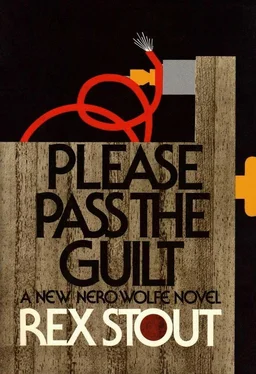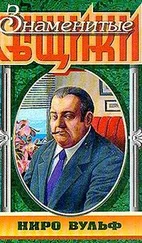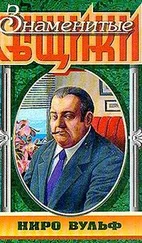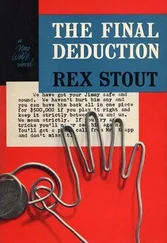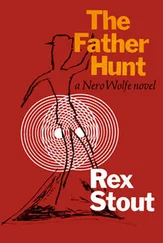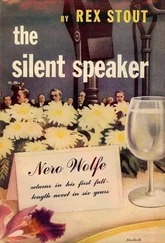Wolfe entered, told me good morning first and then her, put the flowers for the day in the vase and arranged them so he would have the best view, swiveled his chair to face her, and sat.
“I don’t thank you for coming,” he said. “I’m not disposed to thank you for anything. I have reason to believe that you are withholding information that would be of value. Indeed, I think you have lied. Don’t bother to deny it. I tell you that only to establish the temper of the conversation. I’ll be trying to find support for my opinion. What will you be doing?”
She would be staring. She was staring. “I know what I ought to be doing,” she said. “Leaving. I ought to be on my way out.”
“But you’re not. You wouldn’t, even if I’m wrong, because you want to know why. That’s what makes us the unique animal, we want to know why and try to find out. We even try to discover why we want to know why, though of course we never will. It’s possible that upon consideration you have concluded, or at least suspected, that you may have made a mistake or two. For instance, nineteen days ago, a Monday evening, I asked you if you thought it likely that the person who put the bomb in the drawer was present in this room and you said you had no idea. ‘None at all,’ you said. And twelve days ago, again a Monday, when you were alone with Mr. Goodwin and he asked what you would say if he asked that question, you replied that you would say exactly the same, you had no idea. I’ll try once more. What would you say now?”
“My god,” she said. “How many times...”
“What would you say now?”
“The same!”
Wolfe nodded. “You should know, Miss Lugos, that this is being recorded electronically. The recorder is on a closet shelf in the kitchen, so that a man there can change the tape if necessary. I now have a special reason for wanting to learn beyond question the nature of your relations with Kenneth Meer. What you tell me will be tested thoroughly by wide inquiry. So?”
“It has already been tested by the police.” Her chin was up and a muscle in the side of her neck was twitching, barely perceptible even by good eyes. “We’re not — we’re associated in our work because we have to be. Personally we don’t — we are not close.”
“But he would like to be?”
“He thinks he — yes.”
“Do you read books?”
She did what everybody does when asked an unexpected and irrelevant question. Her eyes widened and her lips parted. For two seconds exactly the same as if he had asked her if she ate cats. Then she said, “Why — yes. I read books.”
“Do you read much fiction?”
“I read some .”
“Then you may be aware that most competent storytellers, even lesser ones, have an instinctive knowledge of the possibilities of human conduct. They often present two characters who have a strong mutual attachment in secret but who have other people believing that they are hostile. But not the reverse. Not two who have a mutual animus but have others believing that they like or love each other. Storytellers know it can’t be done. So do I. I know I can’t learn if you and Mr. Meer are in fact close by asking you questions and watching your face as you answer them, so I won’t try. I know it’s futile for me to ask you anything at all, but I wanted to see you again and hear you speak, and I would like to ask one specific question, more for what the question will tell you than for what the answer will tell me. Mr. Goodwin got your detailed account of your movements on that Tuesday, May twentieth. I would like one detail of the preceding day, Monday, May nineteenth. In the early afternoon, shortly after lunch, Mr. Meer was with you in your room. Tête-à-tête. What did you talk about? What was said?”
I won’t say I actually enjoyed what happened next, but I appreciated being there to see it. Having seen him walk out on people I don’t know how many times, say a hundred, it kind of evened up to see him once as the walkee instead of the walker. She didn’t glare or clamp her jaw or spit, she just go up and went. I admit he didn’t glare or spit either; he just sat and watched her go. I did too until she was out; then I stepped to the hall to see that she shut the front door. When I stepped back in, he was opening the drawer to get the bottle opener — so he had rung for beer.
“Tell me once more,” I said, “that I understand women better than you do. It gives me confidence. But don’t ask me to prove it. I said two weeks ago that she didn’t open the bag and shake it. I also said she didn’t plant the bomb, but now I don’t know. Did Copes strikingly suggest that she did?”
“Confound Copes,” he growled. “And nothing can be expected from Saul or Fred during the weekend.”
He picked up the top item on the stack of the morning mail. It was a check from Mrs. Odell for $65,000.
Kenneth Meer was early too. When I answered the doorbell a little before three, I saw his car down at the curb, a dark green Jaguar. He had an oversized brief case, brown leather, under his arm, presumably to save the trouble of locking the car, and when I asked if he wanted to leave it on the hall bench, he said no and took it along to the office. I said before, when I first saw him, that his poorly designed face was tired too young, and now, as he sat in the red leather chair and blinked at Wolfe, his long, pointed nose above his wide square chin looked like an exclamation point with a long line crossing at the bottom instead of a dot.
He kept the brief case on his lap. “I resent this,” he said. He sounded as peevish as he looked. “Why couldn’t I come yesterday — last evening? Why today?”
Wolfe nodded. “I owe you an apology, Mr. Meer. You have it. I hoped to have by now definite information on a point I wanted to discuss with you, but it hasn’t come. However, since you’re here, we may as well consider another point. Your bloody hands. A week after the explosion of that bomb you were in distress, severe enough to take you to that clinic and then to me. Later, when I became professionally involved, the nature of your distress was of course of interest. There were various possibilities: You had yourself put the bomb in the drawer and the burden of guilt was too heavy for you. Or you hadn’t, but you knew or suspected who had, and your conscience was galling you; your imagined bloody hands were insisting, please pass the guilt . Or merely the event itself had hit you too hard; the sight of the havoc and the actual blood on your hands had put you in shock. Those were all valid guesses, but Mr. Goodwin and I didn’t bother to discuss them; we rarely waste time discussing guesses.”
“I like that, please pass the guilt ,” Meer said. “I like that.”
“So do I. Mr. Goodwin will too. He once said that I ride words bareback. But the devil of it is that after more than three weeks the guesses are still guesses, and it may possibly help to mention them to you. Have you a comment?”
“No.”
“None at all?”
“No.”
“Does the distress persist? Do you still get up in the middle of the night to wash your hands?”
“No.”
“Then something that has been done or said must have removed the pressure, or at least eased it. What? Do you know?
“No.”
Wolfe shook his head. “I can’t accept that. This morning I was blunt with Miss Lugos and told her I thought she was lying. Now I think you are. There is another point concerning you that I haven’t broached that I’ll mention now. Why did you tell a man that anyone who wanted to know how it happened should concentrate on Helen Lugos?”
Meer didn’t frown or cock his head or even blink. He merely said, “I didn’t.”
Читать дальше
